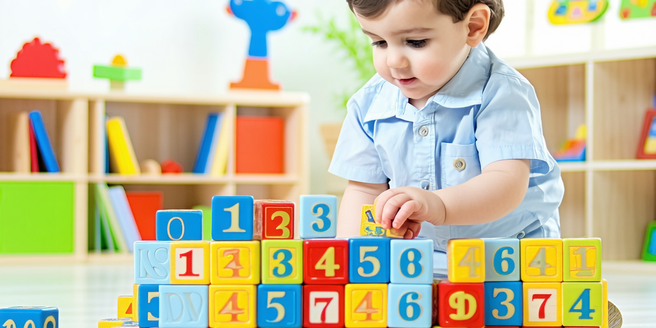
Understanding the Importance of Early Math
| Skills | Description | Benefits |
| Number Sense | Understanding of numbers and their relationships. | Helps in mathematical reasoning and problem-solving. |
| Pattern Recognition | Ability to identify and create patterns. | Enhances logical thinking and prediction skills. |
| Measurement | Understanding of size, volume, and dimensions. | Improves spatial awareness and comparative analysis. |
| Geometry | Knowledge of shapes and their properties. | Supports spatial reasoning and visualization skills. |
| Problem Solving | Ability to find solutions to mathematical challenges. | Fosters critical thinking and decision-making. |
| Data Analysis | Interpreting information and trends from data. | Essential for scientific inquiries and predictions. |
Tips for Introducing Math Concepts to Young Children
Introducing math concepts to young children can be an exciting journey filled with opportunities for exploration and discovery. One effective approach is to use everyday situations to highlight mathematical ideas. For example, cooking involves measurement, counting, and sequencing, making it a great activity for learning. Additionally, playing with blocks or building toys can illustrate geometric concepts and spatial awareness. It’s important to communicate with children in a way that sparks their curiosity, allowing them to ask questions and solve problems at their own pace. Encouraging children to express their thinking and reasoning also nurtures a positive relationship with math. Moreover, using visual aids and manipulatives can help make abstract concepts more concrete. Finally, it’s crucial to celebrate successes, no matter how small, to build confidence and a love for learning. By incorporating these tips, parents and educators can help children develop a strong foundation for future math learning.
Fun Math Activities for Preschoolers
Engaging preschoolers in fun math activities can lay a strong foundation for their mathematical development. A simple yet effective activity is sorting objects by color, shape, or size. This helps children understand classification and develop fine motor skills. Another exciting activity is treasure hunts that involve following a map or set of directions, which encourages spatial reasoning and problem-solving. Children also enjoy games that involve counting, such as hopscotch or board games with numbered spaces, which can reinforce number recognition and counting skills. Incorporating music and rhythm through songs or clapping patterns can enhance understanding of patterns and sequencing. Even during crafts, incorporating concepts like symmetry or pattern creation can make learning math enjoyable. Remember, the goal is to create an environment where math feels like a part of everyday play. When children see math as a fun and integral part of their daily activities, they are more likely to develop a love and curiosity for the subject.
Incorporating Math in Everyday Play
Incorporating math in everyday play is a natural way to enhance children’s learning experiences. Playing with building blocks or construction sets can introduce concepts such as balance, geometry, and sequencing. Storytelling with math-related themes, such as counting or measurement, can also engage a child’s imagination while imparting valuable skills. Arts and crafts time can integrate concepts like shapes, symmetry, and pattern recognition, providing a hands-on way to explore math. Outdoor games such as hopscotch, jumping rope, or ball games can include counting and timing, helping children develop mathematical concepts in a fun and physical manner. Encouraging children to participate in shopping activities, such as counting items or identifying geometric shapes on packaging, can make math a part of daily life. Additionally, using puzzles and board games that require strategic thinking can strengthen problem-solving skills. By seamlessly integrating math into daily play, children can develop their skills in a relaxed and enjoyable setting.
Using Technology to Enhance Math Learning
Technology has become a powerful tool in enhancing math learning, offering a dynamic and interactive platform for children to engage with mathematical concepts. Educational apps designed for young learners can provide diverse activities that cater to different learning styles, from visual to auditory and kinesthetic. Interactive games can present math challenges in a storytelling format, making learning more engaging and relatable. Online platforms often offer adaptive learning paths, allowing children to progress at their own pace while receiving instant feedback. Virtual manipulatives, such as digital blocks or counters, enable children to experiment with numbers and operations in a hands-on manner. Parents and educators can use technology to introduce children to real-world applications, such as coding or using spreadsheets, which demonstrate the practical use of math in daily life. However, it’s imperative to balance screen time with physical activities and traditional learning methods to ensure a well-rounded educational experience for children.
Overcoming Challenges in Early Math Education
Early math education can present unique challenges that educators and parents must navigate to provide effective learning experiences. One significant challenge is addressing diverse learning styles and paces. Tailoring instruction to meet individual needs can help children grasp concepts more effectively. Overcoming math anxiety is another essential focus; creating an environment where mistakes are viewed as learning opportunities can build confidence and reduce fear. Encouraging children to verbalize their thought processes can also help identify obstacles and provide clarity. Limited resources can be a barrier, but utilizing everyday objects as teaching tools or accessing free online resources can offer varied learning experiences. Another challenge is integrating math instruction into other subject areas seamlessly; using themes or projects that require math applications can provide context and relevance. By addressing these challenges with creativity and persistence, educators and parents can help children develop a strong mathematical foundation and a positive attitude towards the subject.
Role of Parents in Math Skill Development
Parents play a crucial role in the development of their children’s math skills. Their involvement can significantly influence a child’s attitude and success in learning math. Parents can create a positive math environment at home by engaging in activities that incorporate math concepts, such as cooking, shopping, or gardening, which provide practical applications of math. Encouraging questions and discussions about math in everyday scenarios can help children see its relevance. Moreover, parents can be role models by demonstrating a positive attitude towards math, showing that it is not just a subject but a valuable life skill. Reading stories with math themes and exploring math games can make learning enjoyable and interactive. Additionally, providing support and resources, such as educational apps or visiting science museums, can further enhance a child’s learning experience. By taking an active interest in their child’s math education, parents can foster a strong foundational understanding and a lifelong appreciation of mathematics.
Resources for Early Math Learning
There are numerous resources available for enhancing early math learning, catering to different learning preferences and environments. Books with math-related stories or rhymes can introduce young children to concepts in a fun and engaging way. Many online platforms offer interactive games that reinforce skills such as counting, pattern recognition, and basic arithmetic. Educational apps provide tailored activities that adapt to a child’s learning level, making practice enjoyable and effective. Toys and games designed to teach math, such as counting bears or geometric puzzles, offer a hands-on approach to exploring concepts. Visiting local libraries or museums can provide children with additional experiences, such as math story hours or interactive exhibits. Support groups or forums for parents can also offer valuable tips and activities to share with their children. These resources, when used effectively, can complement formal education and help children build a strong mathematical foundation while nurturing their natural curiosity and interest in the subject.
Assessing Math Progress in Young Learners
Assessing math progress in young learners is crucial for identifying strengths and areas for improvement. Observations during play and structured activities can provide insights into children’s understanding of concepts. For instance, watching how children use counting in day-to-day activities can reveal their grasp of numbers and operations. Open-ended questions and discussions about math-related tasks allow children to demonstrate their reasoning, offering a deeper understanding of their thought processes. Portfolios that include samples of children’s work over time can showcase growth and areas needing reinforcement. Informal assessments, such as math games or puzzles, can offer additional insights into a child’s capabilities without the pressure of formal testing. Parent-teacher conferences are also valuable for exchanging observations and collaborating on strategies for support at home and school. Regular assessment helps tailor the educational experience to each child’s needs, ensuring they can build confidence and progress effectively in their mathematical journey.
Preparing for a Smooth Transition to School Math
The transition to school math can be significant for young learners, and preparing for it involves creating an environment that fosters both curiosity and confidence. Familiarizing children with routines similar to those they will encounter in school, such as structured learning times and group activities, can ease the transition. Encouraging a growth mindset, where effort and persistence are valued, can help children approach new math challenges with resilience. Reinforcing the basics through play-based learning activities, such as number games or pattern exercises, ensures children possess essential skills before starting school. Introducing school-like tasks, such as following instructions or completing assignments, prepares them for the increased demands of a classroom setting. Communication with future teachers about a child’s interests and strengths can aid in creating a supportive learning atmosphere. By emphasizing foundational skills and a positive attitude, parents and educators can help children confidently embrace the new world of school math.

